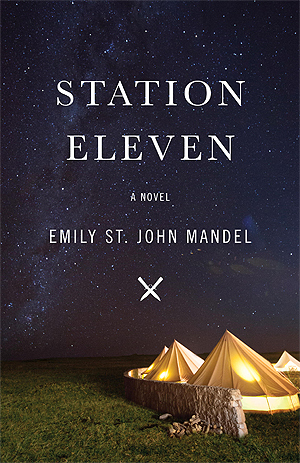
Station Eleven by Emily St. John Mandel is a story, not truly of civilization’s downfall, or the effects of a pandemic. The book was too far removed from that story line on either end. More so, the story is about humanity’s ability to carry on despite all odds. Following the Toronto production of King Lear, a pandemic strikes, wiping out 99% of the population. 15 years later, a travelling theatre and music troupe tours the wasteland of what remains (of one small part of North America). Station Eleven tells the story of five people, all connected by one man, and their fates from before, during, and after the pandemic.
Station Eleven is well written, and the story was, overall, interesting. However, I did have some issues that really dragged down my impression of the book.
First, A virus that kills its host in 48 hours would not be very effective at infecting 99% of the world’s population. The more deadly a disease, typically the less contagious. And, logically, the faster a disease kills off its host, the fewer people who are infected. For example, MERS has a fatality rate between 30 and 40%, but the average basic reproduction number is less than R1. Even the Spanish Flu, our last biggest outbreak prior to COVID-19, has a fatality rate between 1 and 10% with an average basic reproduction number between R2 and R3. Compare this to the Chickenpox, which has a fatality rate of less than 0.1% and an average basic reproduction number between R8 and R9.
In the book, they refer to the Georgie Flu as a mutation of the Swine Flu. Swine Flu only has a fatality rate of 0.2% with an average basic reproduction number of R1.5. Basically, I’m just trying to illustrate that the pandemic that sets off the whole collapse and redevelopment of civilization was unrealistic. If you’d told me it was bioengineered, however vaguely, I could have been okay with it. But I can’t be on board with your terribly thought out disease.
Secondly, Arthur. Arthur is truly an awful character. Not that he is badly written, but just that he is so incredibly boring. And the fact that all of the more interesting characters have this boring middle-aged white man in common, is so blah. There is a reason I mainly read books by women: so that I don’t have to read about boring middle aged white men who are on their third marriage and can’t seem to get their life together enough to be a present father or husband.
What I would love to say to Arthur is that acknowledging that you are a shitty husband and father doesn’t forgive all of your wrongs. Deciding to move to where your kid and ex-wife live when the kid is 8 doesn’t forgive all of the broken promises and absenteeism. Falling in love with another woman while you are married doesn’t make it okay to invite that woman to your anniversary dinner or to have started up an affair at all.
Thirdly, and finally, you all already know how I feel about a non-linear narrative. So i’ll just leave it at that. I wanted an interesting post-apocalyptic/post-pandemic story, and I got a little of that, but not nearly enough. I mean, this is my own fault, because I didn’t read the whole synopsis, and it does clearly state that it moves back and forth in time.
I can see why Station Eleven is a book that many people enjoy, but, once again, it just wasn’t the book for me.
